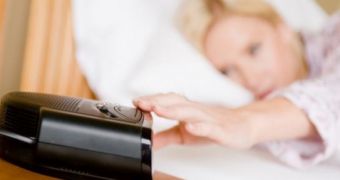Hitting the snooze button once, twice, ten times in the course of a morning has become, for many, part of the wake-up ritual, as having that daily cup of black coffee. As research has repeatedly shown, hitting the snooze button is becoming something of a common occurrence, as we all try to hold back the beginning of another hectic day and perhaps make up for the lost sleep. One way to break the circle is to go to bed earlier, as FitSugar points out.
One thing that is certain so far is that sleeping 5, 20, or 40 minutes more after the alarm goes off for the first time does not, in any way, compensate for the sleep we’ve been losing. Neither does it make us feel less tired or, for that matter, more willing to get out of bed and go to work. The easiest and most common-sense way to break this bad habit and get a resting sleep is to go to bed earlier, as the aforementioned e-zine pinpoints in a recent piece.
Instead of going to bed at our usually-designated hour, we should do it half an hour sooner (or more, if it takes us about an hour to finally muster the courage to get out of bed when the alarm goes off). We should also set our body to “wake up” at the first ring by repeating it to ourselves a couple of times before falling asleep.
Another trick into breaking the hitting-the-snooze-button circle is to avoid any unwanted distraction before bedtime. This means no TV, no computer, and no last-minute work papers, of course, because they might distract us to such an extent that we either go to bed filled with anxiety, or we fall asleep in the middle of things. If bedtime has arrived, we must put everything else aside and prepare for sleep – not for work or watching some mindless show we don’t like either way, health experts are also telling us.
In a research conducted in 2004, Dr. Edward Stepanski studied sleep fragmentation at the Rush University Medical Center in Chicago. His conclusion was that waking up to hit the snooze button and then going back to bed was one of the worst ways people came up with to deceive themselves that they were getting rest. “Even a subtle noise that doesn’t actually wake you up is disruptive enough to affect the sleep quality. That’s why someone who falls asleep with the TV on may wake up exhausted. So, if a person is rousing themselves enough to reset a clock, there’s likely to be an even more profound effect.” Dr. Stepanski was explaining at the time.
So, even if we’re not fully aware of it, sleeping after the alarm goes off actually does us more harm than good. It’s about time we tried a different approach to it then.

 14 DAY TRIAL //
14 DAY TRIAL //